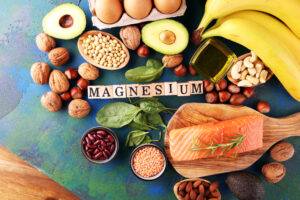 I recently read an article by Carolyn Dean MD, ND, who wrote “The Magnesium Miracle and Magnesium: The Missing Link to Total Health.” Please remember — I take all of these things with a grain of salt. I don’t think anything is a miracle; however, the article is worth reading to learn Dr. Dean’s opinion. Dr. Dean cites many studies in her advocacy, leading me to many original published scientific studies.
I recently read an article by Carolyn Dean MD, ND, who wrote “The Magnesium Miracle and Magnesium: The Missing Link to Total Health.” Please remember — I take all of these things with a grain of salt. I don’t think anything is a miracle; however, the article is worth reading to learn Dr. Dean’s opinion. Dr. Dean cites many studies in her advocacy, leading me to many original published scientific studies.
What do we know objectively?
- Magnesium (Mg) is needed to help enzymes in 600 body functions. It is an essential mineral.
- Magnesium is necessary for survival, but you can’t naturally produce it.
- Common sources of Mg are in greens, nuts, seeds, wheat, oat bran, and whole grain.
- Women usually need 310-320 mg of magnesium, 350-360 mg if pregnant.
- Men need 400-420 mg.
- Half of Americans don’t get enough magnesium.
Research has shown:
- Mg helps get calcium into the bones to reduce the risk of fractures by up to 62%.
- Mg lowers migraines by 50%.
- Mg can ease restless leg syndrome by 59%.
- Mg can lower the risk of a kidney stone by 80%.
But what about weight?
- Magnesium is thought to help promote better sleep. Studies have shown Mg calms the nervous system, lowers stress hormones, eases anxiety, and boosts deep sleep by 3 hours per night. There are many studies that suggest poor sleep can lead to weight gain for a multitude of reasons. (Keep an eye out for future blogs on this topic.)
- Magnesium lowers metabolic syndrome, reducing blood pressure, hyperglycemia, and hypertriglyceridemia. Read the study here.
- Recent tests (a prospective study of 155 people) show that those who get 300 mg of Mg a day slash their diabetes risk and are 25 pounds lighter than those who have lower Mg levels. Read the study here.
So where are you? What is your Magnesium level? If you eat a lot of processed foods — the “American diet” — you are likely missing Magnesium. It’s easy to supplement, but you should know where to start. You can complete our Micronutrient test at Biohackr Health (rather than going to an outside lab for a blood draw) to figure out where you stand on this (as well as a ton of other vitamins and minerals).
We are not trying to sell our testing. We are trying to help you assess how you can make a small, incremental change, which could benefit your body baseline and improve aging and longevity. This is not fringe medicine — this is figuring out how to optimize you, starting with nutrients and building up.